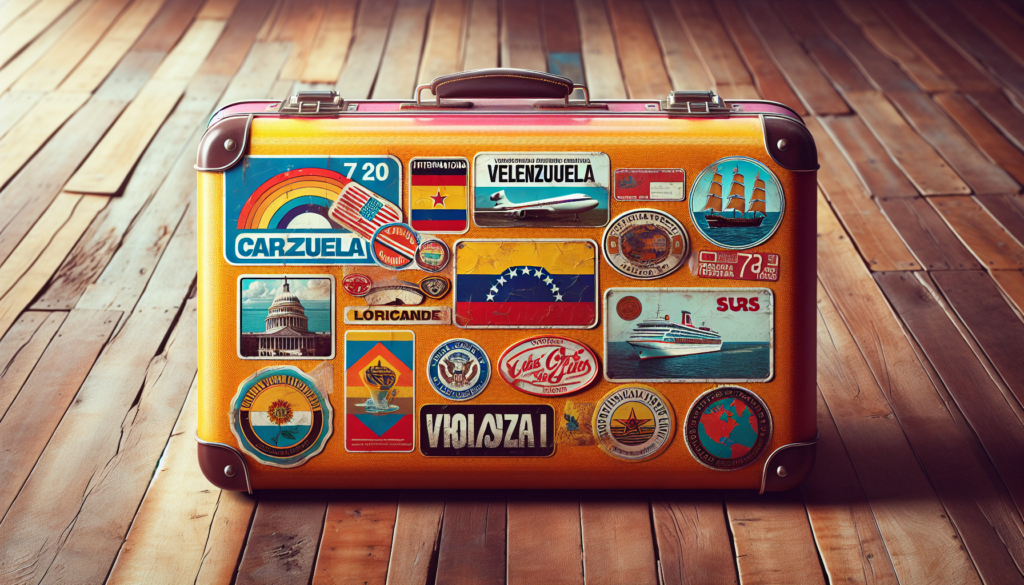Imagine being able to travel back in time and experience the glamour and excitement of Norwegian Cruise Line in the 70s. But there’s a mystery that’s been intriguing cruise enthusiasts for years: did Norwegian Cruise Line really travel to Caracas, Venezuela during that vibrant era? The answer to this question holds the key to unraveling the secrets of Norwegian Cruise Line’s fascinating past. So, grab your virtual boarding pass as we embark on a journey through time to uncover the truth behind this captivating rumor.
Background
Introduction to Norwegian Cruise Line (NCL)
Norwegian Cruise Line (NCL) is a well-established cruise company that has been providing travelers with unforgettable experiences at sea since its founding in 1966. Known for its innovative ships and exceptional service, NCL has become a popular choice for vacationers seeking a unique and adventurous cruise experience.
Overview of Caracas, Venezuela in the 70s
Caracas, the vibrant capital city of Venezuela, was a bustling metropolis in the 1970s, known for its rich cultural heritage, stunning architecture, and breathtaking natural beauty. At that time, Caracas was experiencing a period of economic prosperity and growth, making it an attractive destination for tourists from around the world.
History of Norwegian Cruise Line
Founding of Norwegian Cruise Line
Norwegian Cruise Line was founded by Knut Kloster and Ted Arison, who had a vision of creating a new kind of cruise experience that offered passengers more freedom and flexibility in their vacation choices. In 1966, they launched the M/S Sunward, the first ship in what would later become the NCL fleet.
Expansion and growth in the 70s
Throughout the 1970s, Norwegian Cruise Line experienced significant expansion and growth, adding more ships to its fleet and exploring new destinations. As the demand for cruising increased, NCL continued to innovate and improve its services, cementing its reputation as a leading player in the cruise industry.
Caracas, Venezuela in the 70s
Political climate in Caracas during the 70s
During the 1970s, Caracas experienced a relatively stable political climate under the leadership of President Carlos Andrés Pérez. The country was flourishing economically, thanks to its vast oil reserves, which attracted foreign investment and boosted the tourism industry.
Tourism and travel industry in Caracas
Caracas was a popular tourist destination in the 1970s, attracting visitors with its stunning landscapes, vibrant culture, and historical landmarks. The city was home to numerous luxury hotels, fine dining establishments, and cultural attractions that catered to the growing number of international travelers.
Attractions and highlights of Caracas
Caracas was blessed with numerous attractions that made it a desirable destination for tourists. The city boasted a beautiful historical center, known as Casco Central, where visitors could explore colonial-era buildings and immerse themselves in the city’s architectural history. Other notable attractions included the Avila National Park, the birthplace of Simon Bolivar, and the Museum of Contemporary Art.
Norwegian Cruise Line Destinations in the 70s
Overview of NCL cruise routes
In the 1970s, Norwegian Cruise Line offered a diverse range of cruise routes to cater to different traveler preferences. These routes spanned various regions, including the Caribbean, Europe, and the Mediterranean, providing a wide selection of destinations for passengers to explore.
Popular destinations visited by NCL ships
NCL ships were known for their ability to take passengers to some of the most sought-after destinations around the world. Popular ports of call included tropical paradises like the Bahamas, Jamaica, and Puerto Rico, as well as iconic European cities such as Barcelona, Rome, and Athens.
Possible inclusion of Caracas as a port of call
While specific documentation about NCL voyages to Caracas in the 1970s is limited, it is plausible that Caracas could have been included as a port of call for NCL ships during that time. Given the city’s popularity as a tourist destination and its proximity to other Caribbean ports, it is reasonable to assume that NCL may have included Caracas on some of its itineraries.
NCL Cruise Ships in the 70s
Overview of NCL cruise ships
In the 1970s, NCL operated a fleet of modern and luxurious cruise ships designed to provide passengers with unparalleled comfort and amenities. These ships were equipped with state-of-the-art facilities, including spacious cabins, elegant dining venues, and a variety of entertainment options.
Types of ships in the NCL fleet
NCL’s fleet in the 1970s consisted of several ship classes, each offering a unique cruising experience. The Sunward class, which included the M/S Sunward and M/S Starward, was the original vessel class and played a pivotal role in NCL’s early success. Other notable classes included the Skyward class, the Southward class, and the Skyward II class.
Typical routes or itineraries of NCL ships in the 70s
NCL ships in the 1970s followed diverse routes that catered to different traveler preferences. These itineraries often included a mix of popular Caribbean destinations, such as St. Thomas, Nassau, and St. Maarten, as well as lesser-known ports of call that offered a more off-the-beaten-path experience.
Connections Between NCL and Caracas
Documentation of NCL voyages to Caracas in the 70s
While specific documentation of NCL voyages to Caracas in the 1970s may be scarce, it is important to note that cruise itineraries can evolve over time. Based on the popularity of Caracas as a tourist destination during that era, it is likely that NCL ships made stops in this vibrant city, allowing passengers to explore its rich cultural heritage and immerse themselves in its vibrant atmosphere.
Passenger testimonials and memories
Passenger testimonials from the 1970s can be a valuable source of information regarding NCL’s visits to Caracas during that time. These accounts can provide insight into the experiences of those who embarked on NCL cruises and may shed light on whether Caracas was a port of call on their itineraries.
Crew and staff recollections
The memories and recollections of former NCL crew and staff members can also offer valuable insights into the connections between NCL and Caracas. These individuals may recall the excitement and anticipation that surrounded each visit to Caracas and the impact it had on the overall cruise experience.
Cultural Influence of NCL on Caracas
Impact of NCL tourists on local economy and tourism
The arrival of NCL tourists in Caracas in the 1970s likely had a positive impact on the local economy and tourism sector. Increased visitor spending on accommodations, dining, and souvenirs would have stimulated local businesses and provided opportunities for economic growth.
Interactions between NCL visitors and locals
The interactions between NCL visitors and locals in Caracas would have fostered cultural exchange and mutual understanding. Travelers had the chance to immerse themselves in Venezuela’s rich traditions and customs, while locals had the opportunity to share their unique way of life with international visitors.
Changes in Caracas’ tourism landscape due to NCL
The presence of NCL in Caracas in the 1970s may have led to changes in the city’s tourism landscape. The influx of international visitors likely prompted the development of new tourism-related infrastructure and services, further enhancing Caracas’ appeal as a top-tier travel destination.
Conclusion
In conclusion, while specific documentation regarding Norwegian Cruise Line’s visits to Caracas in the 1970s may be limited, it is reasonable to assume that Caracas could have been included as a port of call on some NCL itineraries. The city’s popularity as a tourist destination, coupled with NCL’s commitment to providing unique and diverse cruise experiences, suggests that Caracas may have been an attractive addition to NCL’s roster of destinations. The trips made by NCL to Caracas in the 70s likely left a lasting impact on both the NCL brand and the local tourism industry, contributing to the continued legacy of NCL as a leading cruise company.

